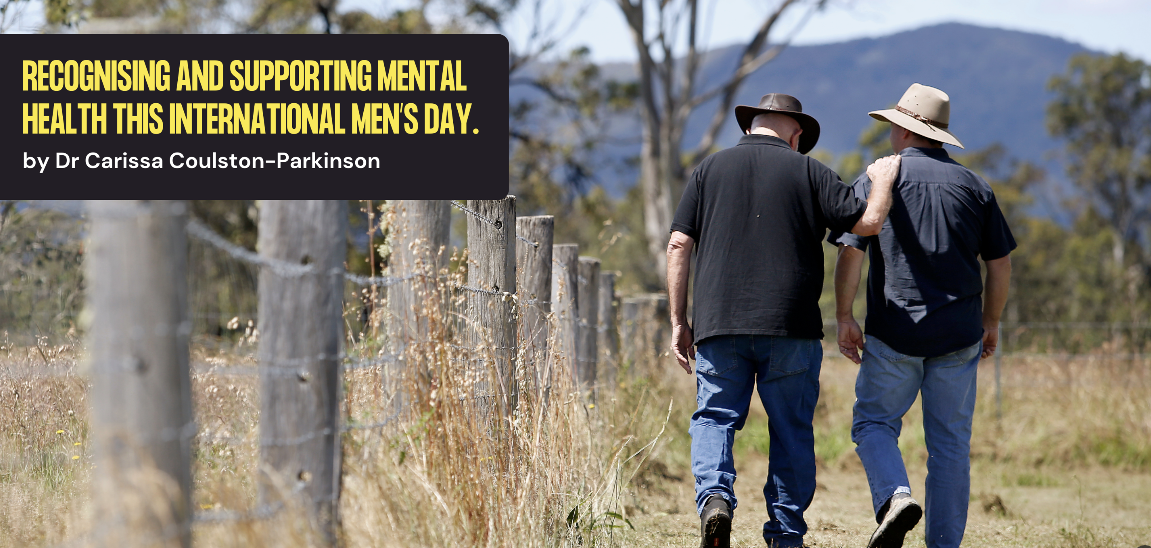The SANE Blog
Recognising and Supporting Mental Health this International Men’s Day
International Men’s Day aims to raise awareness of issues that impact men’s health and well-being. This year, the focus is on suicide and mental health, reflecting the fact that men are significantly more likely to die by suicide compared to women.
Mental ill-health impacts men and women equally, but the way they express and manage this can be very different.
UNDERSTANDING THE MENTAL HEALTH GENDER GAP
The mental health gender gap is a complex issue that cannot be reduced to simplistic generalisations. However, many mental health professionals often report that different patterns emerge in how men and women experience and express mental health concerns.
Triggers and Symptom Manifestation
The most common triggers for depression and anxiety in men include work-related stress, financial pressures, and relationship problems.
In terms of depression, men may be less likely than women to express traditional symptoms like sadness and tearfulness. Instead, they may show irritability, anger, and increased risk-taking behaviour.
In terms of anxiety, men may experience more physical symptoms like muscle tension, stomach aches, headaches, or other somatic complaints. Conversely, women tend to report emotional symptoms such as excessive worry, fear, and restlessness.
Social Stigma and Communication Styles
From an early age, society often teaches males to be stoic, self-reliant, and to suppress their emotions. Men therefore tend to be less open about their mental health issues because they fear being perceived as weak. Conversely, women find it easier to express their emotions and reach out when needed.
Coping Mechanisms and Suicide Rates
Women may be more inclined to seek social support and talk about their feelings, whilst men often rely on action-oriented solutions. Men are more prone to engage in physical activities or work as a distraction from their problems, and unfortunately, men are also more likely to turn to substance abuse (especially alcoholism), isolation, and other unhealthy behaviours.
Given their tendency to avoid opening up and seeking help for mental health problems, men are also around three times more likely than women to die by suicide. In 2022, males accounted for 75.6% of deaths by suicide with the median age in men being 46.0 years.
HOW CAN WE BETTER SUPPORT MEN’S MENTAL HEALTH?
To promote better mental health outcomes for men, it is essential to foster a more inclusive and understanding environment. Ways in which men can be supported include -
- Encourage Open Communication
Creating an environment where men feel comfortable talking about their mental health struggles is crucial. Friends, family, and partners can play a vital role in encouraging open and non-judgemental conversations. It is critical to note that no issue is ever too small or unimportant to share, because any issue can snowball into a bigger issue if not dealt with as soon as it arises.
- Promote Professional Help
Mental health professionals can provide tailored support to address specific needs for men. A local GP or the Australian Psychological Society (https://psychology.org.au/find-a-psychologist) can connect you with a suitable psychologist. There are also useful online resources and support services including MensLine Australia (https://mensline.org.au/) and Head To Health (https://www.medicarementalhealth.gov.au/).
- Male-Focused Support Groups
Male-specific support groups can provide a safe space for men to share their experiences and challenges without fear of judgement. Relationships Australia and ManOnline provide peer support groups for men. The SANE Forums (www.saneforums.org) also provide a safe and non-judgmental space for men to connect with others in a similar situation.
- Workplace Support
Employers can play a significant role in men's mental health by offering employee assistance programs (EAPs), flexible working arrangements, and mental health resources. Creating a supportive workplace culture is vital.
- Community Engagement
Men who engage in community activities and groups tend to build social connections and feel less isolated. Sports, hobbies, and volunteering can provide opportunities for men to connect with others.
International Men's Day is an occasion to celebrate every man's role in life and society, but it is also a reminder of the unique challenges men face in managing their mental health.
Men and women may differ in how they express and seek help for mental health, but the key lies in recognising the triggers and symptoms and understanding pathways for empathy and support.
By fostering an environment where men feel safe to share their mental health challenges, and by encouraging them to seek professional help when needed, significant strides can be made in promoting better mental well-being.
Dr. Carissa Coulston is a Clinical Psychologist with specialist knowledge in the areas of depression, bipolar disorder, anxiety, schizophrenia, intellectual disability, personality disorders, traumatic brain injury and neurological conditions.
SANE provides a range of free telephone and online support services for people over 18 years of age with complex mental health needs and their family, friends and carers. We offer different types and levels of support so you can find what works for you. Choose from counselling, peer support, online groups and events, 24/7 community forums, and online information and resources. Learn more at sane.org/get-support.
When you subscribe to the blog, we will send you an e-mail when there are new updates on the site so you wouldn't miss them.
